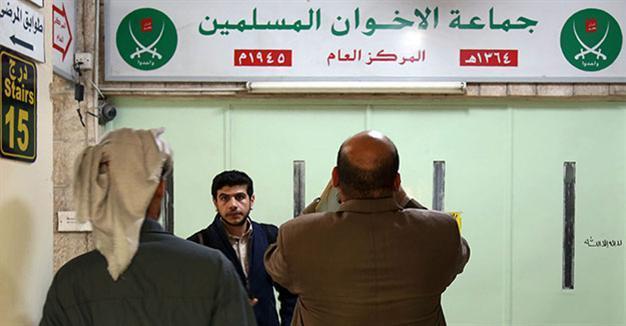Jordan security services 'shut Muslim Brotherhood HQ'
AMMAN - Agence France-Presse

AFP photo
Jordanian security services on April 13 closed the Amman headquarters of the Muslim Brotherhood, the country's main opposition force, which denounced the move as politically motivated.
Previously tolerated for decades in Jordan, the Brotherhood has had tense relations with the authorities since the Arab Spring uprisings that shook the region in 2011.
"Jordanian security searched the headquarters of the Muslim Brotherhood and evacuated it before sealing off the entrance with red wax," said a lawyer for the group, Abdelkader al-Khatib.
"This is clearly a political decision in line with what is happening in the region," he added.
A security source told AFP that the movement's headquarters were "closed on the order of the governor of the capital as the Brotherhood did not obtain legal authorisation" for its activities.
The authorities view the Brotherhood as an illegal organisation because its licence was not renewed in accordance with a political parties law adopted in 2014.
The Jordanian branch of the movement, which was formed in Egypt in 1928 and has affiliates across the region, has wide grassroots support in the kingdom.
The intervention of the security services "has the sole purpose of influencing the upcoming elections and results", Khatib said.
Jordan is expected to hold legislative elections by early next year. The Brotherhood boycotted previous elections in 2013 and 2010, crying foul.
Other governments in the region, particularly the Gulf monarchies, are also deeply suspicious of the Brotherhood, fearing that its brand of grass-roots activism and political Islam could undermine their authority.
The Brotherhood's second-in-command in Jordan, Zaki Bani Rsheid, was sentenced to 18 months in prison in February 2015 for criticising a decision by the United Arab Emirates to blacklist the organisation.
In Egypt, it has been blacklisted as a "terrorist group" and the authorities have cracked down hard on its members, including ousted Islamist president Mohamed Morsi who has been sentenced to death.
Hundreds of Morsi's supporters have been killed and tens of thousands jailed since he was ousted by the army in 2013.
The Jordanian branch of the Brotherhood accuses the authorities of trying to exploit divisions within the organisation.
Last year, the government authorised the formation of a breakaway group known as the Muslim Brotherhood Association.
Analysts said that recognition of the new group risked fanning discontent among the traditional opposition power base at a time when the kingdom is battling jihadists in neighbouring Iraq and Syria.
Jordan joined the U.S.-led coalition fighting the Islamic State of Iraq and the Levant (ISIL) group in 2014 and enjoyed a groundswell of public support for air raids on the jihadists after one of its captured pilots was burned alive in a cage in January last year.
